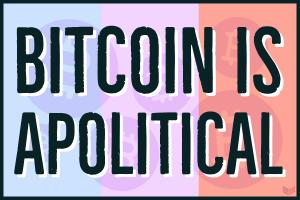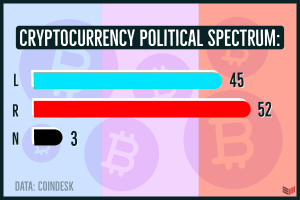
In its core doctrine, bitcoin is about privacy, freedom, and self-sovereignty. Politically, many bitcoiners tend to be libertarian, with ideologies ranging across the conservative-liberal scale. No matter how they disagree on certain socio-economic stances, there is one unwavering, common belief: the government has no business dealing in your money.
A separation of state and money — this is what the bitcoin ethos is built on.

Let’s talk about politics
Ah, one of the two dreadful topics you never dare to bring up at the dinner table. It seems like everything is made political these days, from voting eligibility to how we deal with the COVID-19 pandemic. One thing is clear, from a bipartisan stance: these are topics that should not host a partisan divide, yet they manifest now more drastically than ever.
Bitcoin is dangerously close to becoming politicized — and many would argue that it already is.
With Elizabeth Warren, a highly influential Democratic senator in the United States publicly denouncing bitcoin, and Ted Cruz, a highly influential Republican senator publicly endorsing bitcoin, it seems like we’ve once again manifested a crooked path in a straight line down.
Contention is expected in the debate of bettering the world. But to paint things in black and white is certainly not how we progress forward, and it’s a misrepresentation of what bitcoin symbolizes for all of us.
Bitcoin Works for You, No Matter What You Believe In
Do you strongly believe in your freedoms and accesses (to guns, abortion, or whatever else) as laid out by your constitutional rights? Are you passionate about protecting the planet at all costs? Do you think you’re paying too many taxes for no good reason? Are you wearing a hoodie that says “Eat the Rich” on it?
If you answered yes, no, or I don’t care to any of the questions above, then bitcoin is for you!
In our modern political climate, those who are part of democratic nation-states hold a privilege of liberty and autonomy as allowed by the law — as long as we are not infringing on the individual rights of others. However, even in nations like the United States (known as the “land of the free”), many of us feel an injustice in the legal dictation of what is increasingly allowed or disallowed.
This all ties back to money: Policy is fueled by lobbying funding, elections by marketing budgets. Well, at least in countries like the United States.
Other nation-states are not so lucky. They deal with dictatorial control, exacerbated power imbalances, and extreme poverty and war as a result of corrupted and poorly structured leadership. Many of us could argue that, on a smaller scale, this is even happening in our own backyards.

Bitcoin Gives Us Back Our Independence
One of the most prominent arguments politicians make against bitcoin is that bitcoin fuels crime and corruption due to its pseudonymous transactional nature. But take a look at this from a different stance — global governing policies are not always ethically (or common sensibly) created.
There are states and countries out there where basic rights like access to education or personal banking services are denied to certain groups. It may be a crime to curb these policies with bitcoin, but most of us would probably argue that the real crimes are the existing laws themselves. To fight for justice, we need private and self-sovereign methods of storing our wealth. Really, it’s no different than hoarding cash. The difference though, is that with cash, we have potential issues with transporting wealth, counterfeiting, confiscation, accidental loss or theft, and robbery. Bitcoin solves all of this.
Seeing Bitcoin as a Solution
Whatever issues you’re concerned about, try and see how bitcoin can be a solution rather than another layer to our pile of problems. Over the next few days, I’ll dive into how bitcoin can help solve global wealth inequity, incentivize clean energy production, and protect the vulnerable from corrupt government regimes worldwide.
If bitcoin is pushed away by certain political parties, I’ll only hope we can go back and remember what we were fighting for — freedom, liberty, and justice. Bitcoin brings us closer to that commonwealth goal, no matter your party preference.
So the next time you’re at the dinner table surrounded by family members scattered across the political spectrum, I encourage you to talk about bitcoin. Bitcoin is apolitical, and everyone should be a part of the conversation.
Ready to talk politics? On Twitter? Yeah…that might not be a great…idea… BUT — you can talk about bitcoin with people across the political spectrum and find common ground with #21DaysofBitcoin!